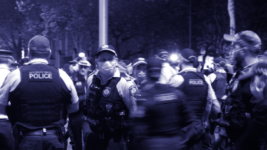NSW Government Uses Knife Crime to Justify Wholesale Random Searches and Surveillance

The first day of the NSW Coroners Court Bondi Junction Inquest, which will inquire into the mass stabbing incident that involved 40-year-old white Australian man Joel Cauchi entering the Bondi Junction Westfield shopping mall on 13 April 2024 to commence randomly stabbing women, along with a male security guard who intervened, only to then be shot dead by a NSW police officer.
On the first day of the inquest, media reports confirmed that the killer had a preoccupation “with weapons, with violence and with mass killing”, but the NSW homicide squad said there’s no evidence he was targeting women, which isn’t too surprising as the authorities tend to downplay misogyny in official narratives, especially when it might be linked to another taboo, that of white terrorism.
Meanwhile, South Australia recently passed “the nation’s toughest knife laws” in March, which involved the roll out of wanding or scanning laws that permit police officers to run small metal detectors over civilians in public, without a reasonable suspicion, on the off chance they’re concealing a knife, which is a questionable technique currently being implemented across the nation.
While perhaps appearing reasonable during a two-minute news grab explanation with accompanying scenes of the Bondi tragedy, these laws don’t add up as knives aren’t like guns. They’re dual-use items. You can pick one up anywhere, and while Cauchi carried his knife, it wouldn’t have been too hard for him to have instead secured a knife in the biggest shopping centre in the area.
So, on the pretext of protecting the people, yet another state is implementing a method of mass surveilling the civilian population out in public, based on a procedure that completely disregards the incrementally established legislated protections of the person against random law enforcement scrutiny, which is especially apparent when considering wanding has a less than 1 percent strike rate.
A burgeoning police state
South Australia passed the Summary Offences (Knives and Other Weapons) Amendment Bill 2025 on 7 March, which contains laws that, along with wanding, include a ban on knife sales to minors, facilitating the prosecution of those knowingly supplying knives to minors for crime, ensuring that certain types of knives are secure in shops and extending school bans to other educational settings.
As South Australian attorney general Kyam Maher divulged the content of the bill to the SA upper house during his 6 February second reading speech, the legislation was revealed to be all about the mass random wand searching of the public, which are laws that have recently been rolled out in NSW and Queensland, while a much earlier set of related laws were enacted in Victoria back in 2009.
The amendment bill inserted new part 14C into the Summary Offences Act 1953 (SA) (the Act). New section 66Z of the Act, allows the SA police commissioner to declare that officers can conduct random metal detector searches in a specified public area, which include places of worship, for up to 6 hours if they hold a reasonable suspicion that “an incident of violence or disorder may take place”.
Section 66Y of the Act permits a SAPOL superintendent to do the same for a specified area if “an incident of serious violence involving a group or groups of people may take place”, which can hold for up to 24 hours.
The laws further stipulate that if a SA police officer does randomly search a civilian entering a zone, they must first run the metal detector over the outside of their clothing, then if the device indicates metal is present – say, in the case of a butter knife or nail file – the civilian/suspect must produce that potential weapon, and if they don’t, officers can move on to conducting a regular search.
The new laws also permit for the random wanding of certain persons, such as someone who has committed a prescribed criminal offence within the last 5 years, under new section 66ZA, although the searching officers must provide the grounds for the search to the subject of it, which appears to be, as in the case of the example, that they committed a crime sometime over the last 60 months.
Section 66ZB of the Act allows for the random wanding of civilians in certain places, such as licensed premises, declared places of worship, declared public events, declared public transport hubs, declared shopping precincts, public carparks and any other place prescribed in regulations. In the cases where the type of place is “declared”, it’s the SAPOL commissioner who makes that decision.
Regular stop and search powers in SA require officers to hold a “reasonable cause to suspect” the commission of a crime. In NSW, this is known as “reasonable grounds for suspicion”. This is to protect civilians from officers searching people they don’t like the look of. And these wanding laws, which are becoming increasingly regular, erode protections against police intrusions into personal space.
Erosion of civilians rights trending
The Victorian government recently toughened its 2009 established designated zone laws, which allow for the random searching of civilians. These laws allow for the searching via a wand or a regular pat down, as well as permitting officers to forage through people’s belongings, with the March amendments upping the 12 hour zone limit to allow for 24 hour declarations.
The changes by the Allan government have further removed the stipulation that a designated zone could only be declared in an area where violence or disorder had occurred within the past 12 months, or a repeat event that involved a violent incident in the past, so that the Victoria police commissioner can declare a zone in a place on the mere suspected likelihood of violence.
At the time of the changes, Liberty Victoria released police data obtained through freedom of information that revealed that over the 24 months to January 2023, 23,718 searches had been carried out in 61 designated areas, 79 percent of which involved wanding, and of the entire searches, only 252 picked up any illegal object or substance, which is a less than 1 percent success rate.
The Minns government passed wanding laws in NSW in June last year, in the wake of the high-profile Bondi Junction mass murder and a nonfatal stabbing of a priest in Wakely, and they allow for the random scanning of civilians in designated areas, where violence has occurred in the last 12 months, with a senior police officer having the power to declare such a zone for the period of 12 hours.
The passing of these laws was also facilitated by the fact that Queensland had just passed laws in March last year to allow for the random wand searching of the public “in all safe night precincts”, which were areas that could already be declared zones warranting extra late-night police attention under existing state laws, as well as at “public transit hubs and on public transport”.
State invasion of the personal
Wanding laws are currently taking hold right across the nation. A lot of the rhetoric to progress them is around youth crime, yet that has taken a dramatic downward spiral over the last decade, while the rights-eroding catch-all effect of these laws empower police officers to increasingly cross the line into civilians’ personal space at their own discretion, despite long-worn laws to protect against this.
In NSW, as in other Australian jurisdictions, the imposition of drug detection dogs in the early 2000s has opened up the random warrantless searching of the public by trained canines. An indication of a civilian by a sniffer dog results in no illegal drugs being found on around 70 percent of occasions, which the NSW Ombudsman first altered the state government to in its 2006 report on the dogs.
Yet, civilians in NSW are subjected to dog searches at public transport hubs, in pubs and clubs and at events, and since mid-last decade this highly flawed procedure is being increasingly accompanied by a strip search.
So, if a dog indicates falsely, which is most of the time, and a pat down turns up nothing, the cops can then demand a civilian get their gear off to make sure the mutt was wrong.
However, wanding laws take the process of selecting random strangers to search and surveil out of the paws of a dog and places it into the hands of an Australian police officer trained and moulded by institutions that have long been renowned to foster racist, misogynistic and prejudicial cultures, which leads to the habit of targeting marginalised and racialised groups.
And as the Allan government in Victoria has recently shown with its liberal amendments to its draconian designated zone laws, these policing techniques that fly in the face of the basic liberties and rights of civilians, will increasingly be broadened until entire cities become 24/7 designate areas, where police can stop and search individuals based on institutionally instilled prejudices.







